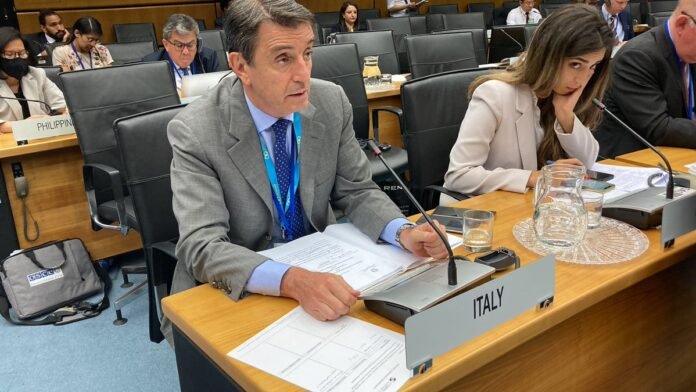VIENNA, 27 GIUGNO – Addressing the 58th CTBTO Preparatory Commission, the Italian Permanent Representative to the International Organization in Vienna made an appeal for further ratifications and signatures of the Treaty which prohibits states parties from carrying out “any nuclear weapon test explosion or any other nuclear explosion”: “Only 10 are missing!”, said Ambassador Alessandro Cortese.
Full Support to Executive Secretary Floyd
The Treaty opened for signature on in September 1996. While it is nearly universally accepted, it has yet to enter into force. To date, 185 states have signed the treaty, and 170 have ratified it. Before entering into force, all 44 states designated as “nuclear-capable” and listed in Annex 2 of the treaty must sign and ratify it. Of the 44 specified states, China, Egypt, Iran, Israel, and the US have signed but not ratified the treaty, and the Democratic People’s Republic of Korea (DPRK), India and Pakistan have yet to sign it. Cortese assured Italy’s full support, together with South Africa, as co-chair of CTBT Art. XIV, to Executive Secretary of the Comprehensive Nuclear-Test-Ban Treaty Organisation (CTBTO) Robert Floyd’s outreach activities for the Comprehensive Nuclear-Test-Ban Treaty universalisation.
Italy and South Africa are co-chairs of this year’s Article XIV Conference, a biennial conference aimed at promoting the CTBT’s entry into force. In today’s meeting, Dr. Floyd, on Monday called on North Korea to renew its 2018 commitment to suspend nuclear testing.
In his statement to Member States, Floyd said that he remains deeply concerned about recent reports that North Korea might resume nuclear tests. “While I can assure you of the readiness of our verification regime to detect any nuclear test, I wish to take this opportunity to call on the Democratic People’s Republic of Korea to renew the commitment it made in 2018 to suspend nuclear testing, and to encourage the Democratic People’s Republic of Korea to sign and ratify the Comprehensive Nuclear-Test-Ban Treaty (CTBT),” Floyd said.
The CTBTO’s unique International Monitoring System (IMS) spans the globe using four state-of-the-art technologies to ensure no nuclear explosion can go undetected. Data from more than 300 seismic, infrasound, hydroacoustic and radionuclide stations is provided in near-real time to Member States and analysed at the CTBTO’s International Data Centre at its Vienna headquarters.
The system quickly and accurately detected all six of North Korea’s nuclear tests: in 2006, 2009, 2013, twice in 2016 (January and September) and 2017.
Background
The CTBT bans all nuclear explosions on Earth, everywhere, by everyone, and for all time. Adherence to the Treaty is nearly universal, with 186 signatory states and 172 ratifying states. However, to enter into force, the Treaty must be ratified by all 44 States listed in its Annex 2, for which eight ratifications – including North Korea – are still required.
The CTBT verification regime is designed to detect any nuclear explosion, whether underground, under water or in the atmosphere. Currently, 303 certified IMS facilities are operating around the world, of a total of 337 when the network is complete. The data collected by the IMS can also be used for a wealth of civil and scientific purposes, including disaster mitigation measures such as tsunami warnings and the tracking of radioactive releases from a nuclear accident. (@OnuItalia)

